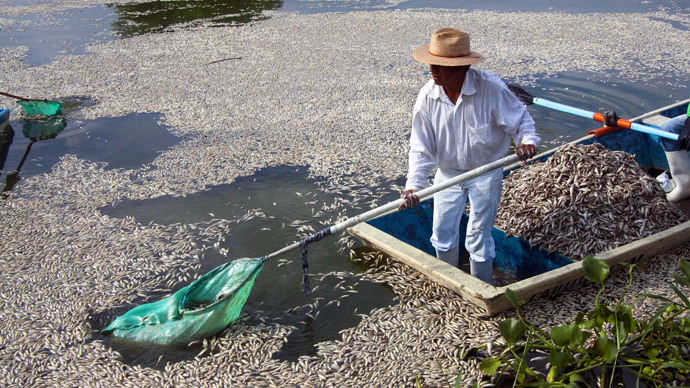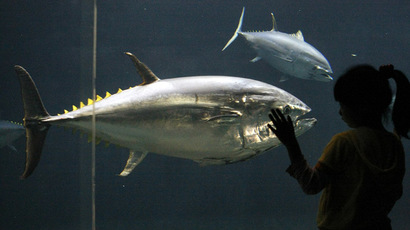53 ton fish-kill: Dead 'popocha' fish removed from Cajititlan Lagoon, Mexico

Mexican authorities are investigating over 53 tons of dead fish washed up on the shores of a lake in the west of the country. A natural cause of death has been ruled out, as lab testing is ongoing. This is the fourth such mass death at the site.
The bodies floated up last week in Cajititlan Lagoon. They belong to a finger-sized type of chub, known locally as ‘popocha’.
One theory is suggesting low water levels, while authorities are also looking into whether negligence by the local wastewater treatment plants could be to blame.
Some 130 fishermen from the town of Tlajomulco worked tirelessly over the weekend to pull the dead fish out of the water, having to shovel them manually and using bulldozers, while wearing masks to protect against the rotting smell, the Jalisco state environment agency said.
"We don't want this problem to worsen, because we would end up in the street," Rigoberto Diaz, a local fisherman, told AFP. He fears this may not be the only species to face the gruesome fate. Others, such as the tilapia, may die too. The bad news is, unlike the popocha, it’s edible.
"We were told that the state government will support us. We don't know when we will be able to fish again," said another fisherman, Mauro Hernan.
This is the fourth mysterious mass death in Cajititlan Lagoon this year.
Speculating about possible causes, Guzman Arayo, director of the University of Guadalajara’s Fresh Water Institute, said the lake is very shallow, and strong wind could have led to a rise in sediment off the lakebed, depriving the fish of oxygen.
"The lake has problems because too much water is being drawn off, and its level is very low," he told the AP, explaining that the nearby housing projects could have led to a lowering of the water levels, but that it was probably not the cause.
When the Jalisco state environment secretary Magdalena Ruiz was reached for comment, she told reporters that “you can’t deny that there’s contamination” caused by negligent practices at the nearby wastewater treatment plant, believing pollution to be the key cause.
Locals believe the bad management of local water resources is causing ever more frequent deaths of marine life.

In July 2013, another incident took place, in which 500 tons of dead fish were ruled to have died as a direct consequence of a nearby company making livestock feed without permit. They were dumping molasses into the Jasilco Reservoir.
Also on Monday, an August 27 fuel spill in the coastal state of Veracruz was ruled to be the cause of bird, turtle and fish deaths. The spill was caused by thieves trying to tap into the pipeline by drilling into it.
While the spill was contained, heavy rains and winds had carried the pollution elsewhere, with containment being very difficult and ongoing at the time of publication.
Dalos Rodriguez Vargas, the Veracruz state environmental prosecutor, told the AP that "The danger is that if it rains more, with the tropical weather system out there, it could overflow again if they don't get it gathered up quickly, and reach the lake."
He spoke of the Laguna Maria Lizamba Lake.
"They are working with all possible speed to get it contained," he added.
Illegal taps into fuel pipelines have been an increasing concern in Mexico, often being the direct cause of mass wildlife deaths.














